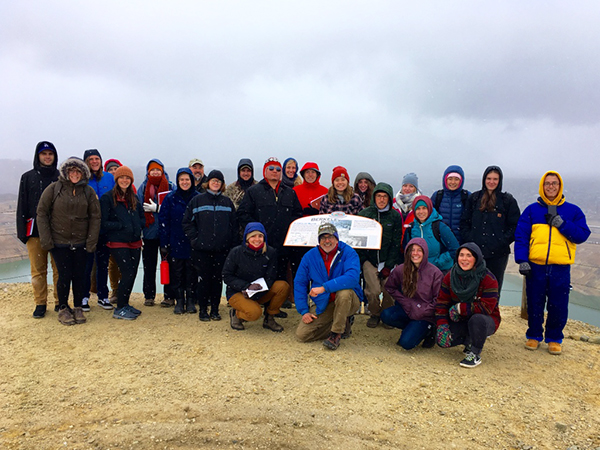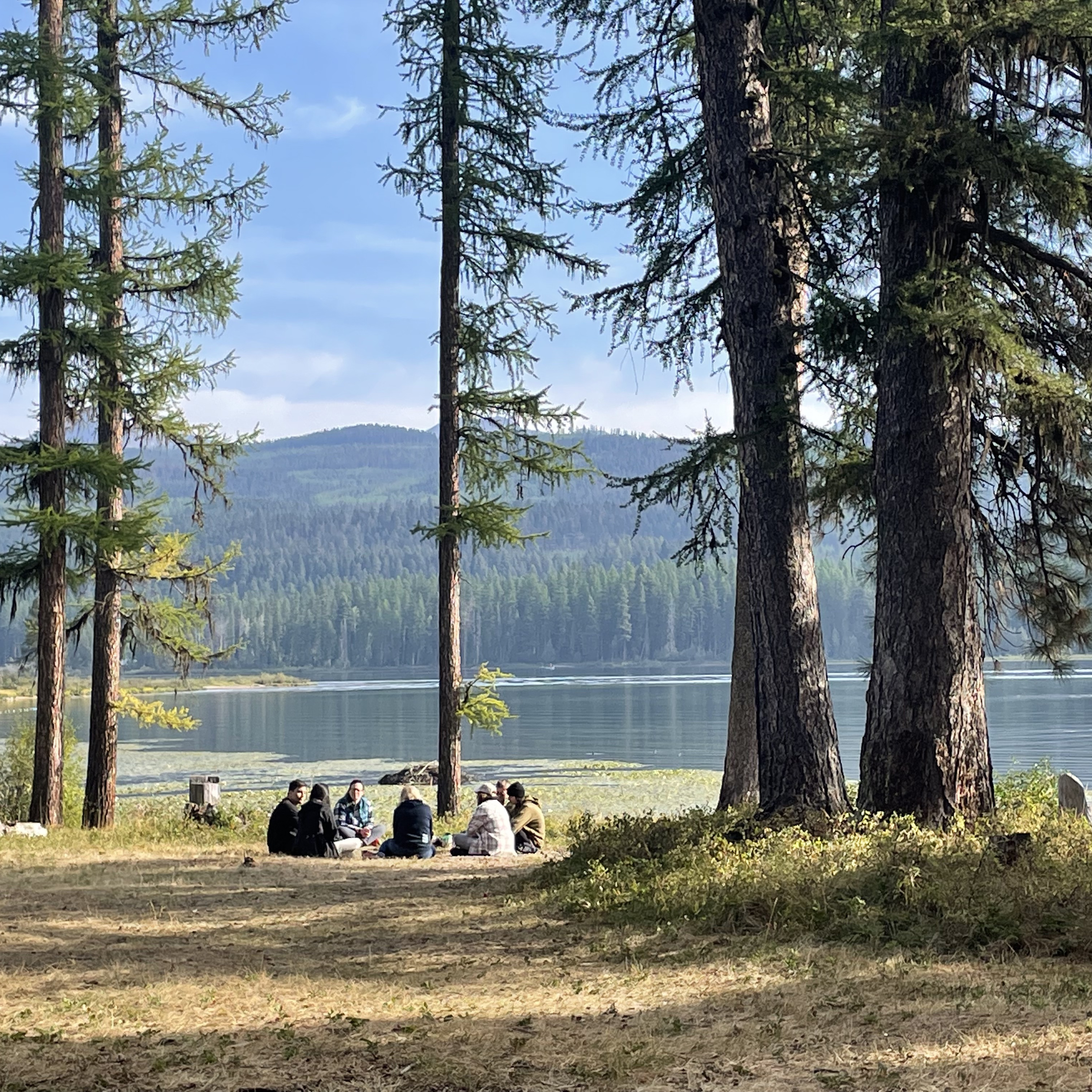Environmental Justice
Environmental Justice is concerned with the inequitable distribution of resources like clean water and air, healthy and affordable food, access to parks and recreation, as well as protection from toxic contamination, and human-caused and natural disasters, among other things. Environmental Justice is also the right to a clean and healthy, nurturing and productive environment “where we live, work, and play”—a motto of the Environmental Justice movement.
The Environmental Justice focus area in Environmental Studies offers opportunities for students to gain a better understanding the causes and consequences of environmental justice problems and to learn how to work toward creating a more fair, just, resilient, and sustainable world. By carrying out community-engaged participatory research and reflecting on your experiences, you will develop skills in analytic problem solving, stakeholder analysis, community organizing, communication, collaboration, and project management. In the process you will also generate useful knowledge and gain insights into effective strategies to help empower communities who are over-burdened with pollution, lack adequate access to environmental services and amenities, and/or face various quality of life challenges.
Building on the study of and coursework about environmental justice problems and solutions, informed by theory and ethical principles of practice, Environmental Justice graduate students conduct citizen science, policy analyses, and other types of collaborative projects with non-profit, faith-based groups, tribes in Montana, and other community partners. Graduate student projects have involved a wide range of environmental health topics, chemical safety and toxics policy, facility siting cases, climate justice, food justice, food sovereignty, and tribal environmental justice issues.
Environmental Justice Field Trip October 2018


Environmental Justice Courses
3 credits
Offered fall
Instructor: Robin Saha
This course explores how and why environmental risks—such as exposure to toxic chemicals and vulnerability to "natural" disasters—and benefits—such as access to natural resources, environmental amenities, and environmental protection—are inequitably distributed among various segments of society. We also examine various strategies and approaches to address environmental injustices and consider their effectiveness under different conditions. The course includes a full-day field trip to the Flathead Indian Reservation. Opportunities are often provided to conduct a service learning project or community-engaged research with a partner organization or entity. Students also have the option of conducting research on an environmental justice topic of their choosing and presenting their findings to the class.
3 credits
Offered spring
Instructor: Rosalyn LaPier
This course is a graduate readings course that will provide a historical overview of federal attitudes and policies toward Native Americans in North America and the environmental issues engendered from these policies, focusing on specific topics: pre-contact America, land ownership and stewardship, water rights, and natural resource development.
3 credits
Offered fall
Instructor: Dan Spencer
In collaboration with the Clark Fork Coalition and other organizations carrying out restoration projects in the Clark Fork River basin and western Montana, this class examines many ethical and philosophical restoration issues while developing and carrying out restoration plans in the Upper Clark Fork River Watershed. Specifically, the class studies the restoration work of the Watershed Restoration Coalition in the Deer Lodge valley, and the restoration of the Clark Fork Coalition's Dry Cottonwood ranch near Deer Lodge. A central theme in this class is integrating the restoration of ecosystems with the restoration of human communities to create sustainable bioregions and landscapes. Students will develop a "restoration ethic" as a philosophical and moral grounding for this work.
1-3 credits
Offered fall and spring
Instructors: Rosalyn LaPier and Marilyn Marler
Interns will work on campus learning about Native plants, ethnobotany, invasive species, landscaping and restoring natural areas, in collaboration with UM's Manager of Natural Areas, Marilyn Marler. Students will meet once a week with instructors, plus work 6 hours per week on a project on campus.
3 credits
Offered intermittently
Instructor: Robin Saha
By supporting local conservation, efficiency, and sustainability initiatives in Missoula, students in this course will develop knowledge and skills for participating in local solutions to climate change. Students will work in groups to plan and carry out projects that will further advance existing climate change mitigation or adaptation efforts locally. Students will gain project management and collaboration skills that are useful for a wide range of future work setting.
3 credits
Offered spring
Instructor: Neva Hassanein
Students in this course will explore the role of qualitative methods in social science research and in social change efforts through participatory action research. Students will study several major approaches to data collection and analysis that fall under the broad umbrella of qualitative research. Emphasis will be placed on qualitative research as a process of better understanding human experience in a complex world in order to inform a theoretical argument and/or take action based on that understanding. The course also raises important issues regarding the practice of science, the relationship of knowledge to democracy, the ethics of research, and the potential for community and professional researchers to collaborate. In addition to readings, lectures, and class discussion, all students will have an opportunity to engage in their own field research project during the semester.
3 credits
Offered intermittently
Instructor: Matthew McKinney
This course prepares students to effectively engage in multiparty negotiation on natural resource and environmental issues. The course is grounded in theory and provides students with an opportunity to develop practical skills in both negotiation and facilitation/mediation. Guest speakers, case studies, and simulations allow students to develop, test, and refine best practices. The course is fast-paced, highly interactive, and serves as the second of three required courses in the Natural Resources Conflict Resolution Program.
Opportunities in Environmental Justice
There are various opportunities for Environmental Justice students to take international travel seminars and attend campus and community lectures related to environmental justice. For example, Robert Bullard, considered to be among the founders and most influential leaders of the environmental justice movement, gave the widely-known Brennan Guth Lectures at UM.
Opportunities are periodically offered to conduct applied research projects on campus. A recent example include conducting an evaluation of UM’s Green Cleaner Policy for the UM Office of Sustainability. Women’s Voices for the Earth, a national women’s environmental health advocacy organization based in Missoula, and other local organizations (listed below), periodically offers environmental justice internships. There are also occasional research assistant opportunities with EVST and other faculty on campus, for example, most recently, with Professor Saha’s Chippewa Cree Tribe Climate Planning Project.
UM’s School of Public and Community Health Sciences also offers an online Masters in Public Health and a 12-credit Certificate of Public Health that provide opportunities for coursework and practicums in topics related to environmental justice, such as environmental health and toxicology. Both nicely complement the Environmental Justice focus area and can augment the professional training and development received in Environmental Studies.
Other Opportunities
Environmental Leadership Series
The University of Montana Sustainability
Our Environmental Justice Partners/Local Environmental Non-profits
- Women’s Voices for the Earth (WVE)
- UM Office of Sustainability
- Jeanette Rankin Peace Center
- Poverello Center
- Missoula Food Bank
- Missoula Urban Indian Health Center
- Homeword
- The Tom Roy Youth Guidance Home
- Missoula Institute for Sustainable Transportation (MIST)
- Missoula Urban Demonstration Project
- 350 Missoula
- 1000 New Gardens
